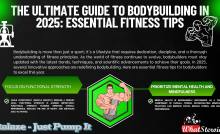High-Rich Protein Diets Are Healthier For Bodybuilding And Don’t Cause Osteoporosis
The fact that strength raining associated with a high-rich protein diet results in muscle growth is well-known. What will surprise you is that such a diet is healthier than you think, contrary to what you may hear before. Experts said high protein consumption might damage your liver and kidney and cause other health problems. Research from Pusan National University in South Korea has demonstrated that eating more proteins helps build muscle and is much healthier than other diets.
The study includes 18 males with no previous weight training experience. They were divided into two groups and told to do strength training for three months. The workout consists of weightlifting with a maximum of 80 percent of their weight. Diet was different for both groups: 60/15/25 percentages of carbs/proteins/fats were the diet specific of the first group, while for the second, the proportions were a bit different-55%carbs/30%proteins and 15% fat.
The amounts of calories were the same for both categories. In the final, individuals whose diet contained more proteins registered a higher increase in muscle mass, while in the second case, the improvements were below the expectations. The body fat percentage was not a big difference, but it was. Those who eat more foods rich in proteins have burned slightly more fat tissues than those who follow a regular diet.
The growth hormone level was also higher in the case of a higher protein consumption diet which is normal if a more evident increase in muscle mass was registered. The balance of good/bad cholesterol was also positively affected in the case of those who eat more protein. HDL level- good cholesterol- has risen, while LDL level has lowered slightly.
The overall body indicators have improved due to a high-rich protein diet mixed with strength exercises. The metabolism rates speed up, body compositions facilitate, and muscle mass builds. And all this with no harm to health as previous studies let us think.
Must Read: Human Growth Hormone Role In Bodybuilding
How much is Above the Normal Protein Diet
*Consume 1g of protein for each pound of body weight.


It is the most popular way among bodybuilders to detect how much protein they need. Relatively easy to calculate. For example, a person who weighs 200 pounds has to eat 200 gr of protein daily.
Here is a big BUT. This formula is not suitable for those with high-level fat. For this category of people, 1 gr of protein for each body weight is too much. It is how we get to the second formula, which is more precise and considers the fat level too.
*Multiply The Lean Muscle Mass In kg to 2, 75 And Get a Daily Dose of Protein.
For this, you have to determine what your fat percentage is. Make the measurements of your height, weight, and waist, and calculate your body fat online. Just search for a “body fat percentage calculator” on Google, and you will get dozens of tools available for free to help you with this task.
For example, if you weigh 80 kg, which means 176 lbs, and your body fat percentage is 14%, then determine your lean muscle mass this way:
- 14% x 80kg=11,2 kg.
- 80kg-11, 2 kg= 68.8 kg.
- 68,8 kg is the weight of lean muscle mass.
- 68,8kg x2.75= 189, 2 gr is the required protein intake daily.
So, for a person who weighs 176 Lbs, the needed amount of protein for maximal muscle gains is 189gr for the day. We have read a detailed post on protein intake; check it out now: How much protein to eat to gain muscle mass to get the best insights on the ideal bodybuilding protein diet.
High Rich Protein Diet Is Not Bad For Bones
Another concern related to eating high amounts of protein is that it harms bodybuilders’ bones. It is because high amounts of calcium come out through the urine, which increases the risk of osteoporosis (a bone disease).
It was a widespread belief until Korean researchers at Kyung Hee University came up with another conclusion. The study includes eight bodybuilders who ate more than 4gr of protein per kg daily. Calcium level eliminated through urine was high but not exaggerated. The calcium level in the blood was within normal limits.
Contrary to what science told us until that moment, high rich protein diet did not affect calcium levels in the body. Hence the likelihood of osteoporosis occurring is minimal. Have to mention that bodybuilders who participated in this study have taken high amounts of calcium from supplements.
Explanation For High Protein Intake And Healthy Bones In Case of Bodybuilders:
Proteins are composed of amino acids and hence are acidic. A disease called metabolic acidosis occurs if the amino acid level grows in the blood. As you know, the human body has the extraordinary capacity to keep its functionality in perfect balance. In this case, the body begins to eliminate minerals from bones, causing the bone to become brittle. That’s why nutritionists warn us to eat proteins in moderate doses to avoid the accumulation of amino acids in the blood.
It’s true, but not in the case of bodybuilders. Exercising puts tension on bones causing growth stimulus, and as a result, the body begins to keep more minerals in the bones. The bigger the stress, the more minerals are stored. So, as long as you work out, your bones are safe despite high protein intake.
To build muscle, you have to eat protein. If you worry about the adverse effects it could have on your health or bones. You are now aware of the actual situation. Train hard, and your protein intake will help you get massive with no risks.
Recent Posts
Creatine vs Myostatin: An Expert’s Analysis
Myostatin, a protein encoded by the MSTN gene, acts as a regulator of muscle growth.…
Raloxifene (Evista) 101: A Non-Surgical Solution for Gyno
Raloxifene, a selective estrogen receptor modulator (SERM), is one of the most valuable yet less…
Mastering Bodybuilding in 2025: Top Fitness Tips for Success
Bodybuilding is more than just a sport; it's a lifestyle that requires dedication, discipline, and…
Why Post-Cycle Therapy (PCT) Fails After a Nandrolone Cycle
Nandrolone, or Deca Durabolin, is an injectable anabolic steroid often used by bodybuilders during the…
Counteracting Anabolic Resistance with Adaptogens in Aging Men
As people age, maintaining muscle mass and strength becomes increasingly challenging due to a natural…
Tips on How to Store Peptides and HGH
When peptides are mixed with bacteriostatic water (BAC water), their longevity is highly influenced by…


